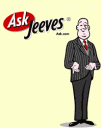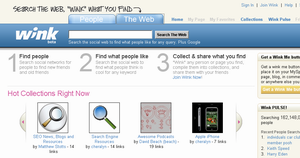After Web 2.0, follow the rise from the simple search to Search Engine 2.0
Web 2.0″. You hear it everywhere, from blogs and websites to TV shows and newspaper articles. Wikipedia describes it as refering to “perceived or proposed second generation of Internet-based services—such as social networking sites, wikis, communication tools, and folksonomies—that emphasize online collaboration and sharing among users.” To simplify it a bit, it represents what we are experiencing nowadays all over the Internet: blogs, widgets, social networking websites, and so on.

Throughout the change of the internet one thing has apparently remained the same: the way we search for information. And one name imediately pops up as an ever-changing company that seems to lead the way in this area: Google. But, as Google expands, it appears that its “Default” function hasn’t changed much. The logos have come and gone, but the way we use Google’s search engine has basically remained the same over the years. I’m not saying this as a bad thing, though, but there are cases when Google’s apparent “rigidity” makes its presence known. With SEO techniques have enabled websites to deceive users in some cases, by offering illusions to be shown in the search engine, you can waste up to hours chasing the information that you need. One short example is the one that almost anyone has encountered in Google: you type in your search, and the first answers are websites that have little or nothing to do with what you typed (even pornographic websites).

Asking Jeeves was an alternative to Google, but it was only surface-deep. It only made you think you were dealing with a more personal website, when in fact it was based on pretty much the same as Google and other search engines. when you gave it a second thought, you noticed that Jeeves didn’t answer all the questions and there must be something else to it, but the idea was nice and made you feel more secure about the answers you were given, simply because of the friendly figure that was showing them to you. The old search engine has been transformed into the simple Ask.com search engine, which has gotten rid of Jeeves, as of February of 2006, after ten years of service.

Wink.com is the first attempt in reaching the 2.0 search-wise that I have discovered. It was presented here by Etherfast some time ago. It is still in Beta, so we can only imagine it will evolve until its final version. But, even though Wink describes itself as a “Social Search Engine”, I found it to be rather a competition between users, with attempts to be “Winked” (even a “Wink me” button that you can put on blogs, MySpace accounts and what have you). A good idea is the implementation of “collections”, which are stuff (photos, links) gathered by users on a certain subject. This makes searching a lot easier, if the respective user put some dedication into making that collection. The bad side to this website is that you can’t always find exactly what you are looking for, because the results are fluctuating and subjective. Anyway, I appreciate the idea, and for now, if everything else fails, it doesn’t hurt to try.

The website that, to me, is truly revolutionary, and marks the beginning of Search Engine 2.0 is ChaCha.com. This takes Wink.com’s idea to a whole new level, improving the way you search. Well, technically, I should say “improving the way you DON’T search”, because, apart from the “standard” search, there is another feature, suitable for lazy people, for people that don’t get the hang of searching through the internet or people that didn’t have any luck in finding what they want. I’m talking here about a person that searches things for you, and all you have to do is tell him (or her) what you want to find. The feature can be accessed by clicking “Search with Guide” on the main page. This will automatically take you to a chat session, where you will be assigned to a guide, ready to answer your requests. I spoke to one of these guides, named DonnaS, who gave me more information about ChaCha.com.

So, it goes like this: you enter the guided system, and tell the guide exactly what you are looking for (let’s say you’re looking the tools that were used by Native Americans to cook in the 18th century), the guide searches for anything matching your cryteria (guides are allowed to use any search engine they please, but my guess is they also use ChaCha - I’ll tell you why in just a second), find it, highlight the exact portion of the page that you need and send you the link. If done right and useful, the search is categorized and subcategorized, and when somebody else searches through ChaCha, this result will come up (that’s why I said that I think guides use ChaCha. It makes their job easier, if they find this page). This way, unlike Google, the ChaCha search is less dependent on keywords, submitted by the website owner, and more relevant to the contents. The guides get payed for their active search time, so they are motivated to find what you need.
The internet is in a constant change, and to find what you want through this immense ammount of information, Searches and Search Engines must adapt. This is why, in my opinion, the need for the Search Engine 2.0 appeared, and, when the time comes, this is why the Search Engine 3.0 will try to grasp the information from what will be the Web 3.0.

0 Comments:
Post a Comment
Subscribe to Post Comments [Atom]
<< Home